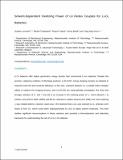Solvent-Dependent Oxidizing Power of LiI Redox Couples for Li-O2 Batteries
Author(s)
Leverick, Graham M.; Tułodziecki, Michał; Tatara, Ryoichi; Bardé, Fanny; Shao-Horn, Yang
DownloadSolvent-Dependent Oxidizing Power of LiI Redox Couples for Li-O2 Batteries.pdf (3.102Mb)
Publisher with Creative Commons License
Publisher with Creative Commons License
Creative Commons Attribution
Terms of use
Metadata
Show full item recordAbstract
Li-O₂ batteries offer higher gravimetric energy density than commercial Li-ion batteries. Despite this promise, catalyzing oxidation of discharge products, Li₂O₂ and LiOH, during charging remains an obstacle to improved cycle life and round-trip efficiency. In this work, reactions between LiI, a soluble redox mediator added to catalyze the charging process, and Li₂O₂ and LiOH are systematically investigated. We show that stronger solvation of Li⁺ and I⁻ ions led to an increase in the oxidizing power of I₃⁻, which allowed I₃⁻ to oxidize Li₂O₂ and LiOH in DMA, DMSO, and Me-Im, whereas in weaker solvents (G4, DME), the more oxidizing I₂ was needed before a reaction could occur. We observed that Li₂O₂ was oxidized to O₂, whereas LiOH reacts to form IO⁻, which could either disproportionate to LiIO₃ or attack solvent molecules. This work clarifies significant misconceptions in these reactions and provides a thermodynamic and selectivity framework for understanding the role of LiI in Li-O₂ batteries.
Date issued
2019-04Department
Massachusetts Institute of Technology. Department of Mechanical Engineering; Massachusetts Institute of Technology. Research Laboratory of Electronics; Massachusetts Institute of Technology. Department of Materials Science and EngineeringJournal
Joule
Publisher
Elsevier BV
Citation
Leverick, Graham M. et al. "Solvent-Dependent Oxidizing Power of LiI Redox Couples for Li-O2 Batteries." Joule 3, 4 (April 2019): 1106-1126. © 2018 Elsevier Inc.
Version: Author's final manuscript
ISSN
2542-4351